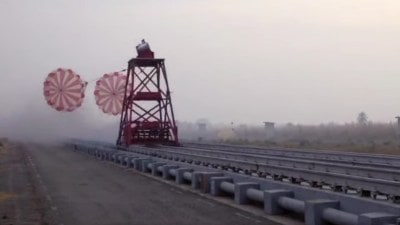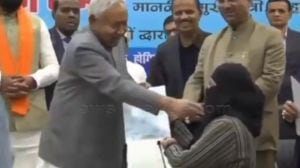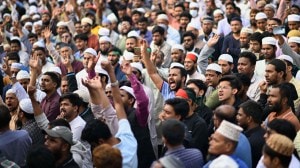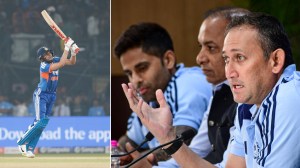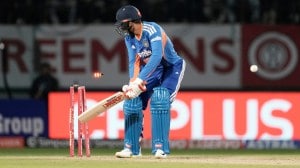Centre signs pact with Tripura govt, TIPRA Motha: The demands, significance of the agreement
The agreement has paved the way for the TIPRA Motha to join the BJP govt in Tripura. Here's what this means for tribal demands in the state, and for the upcoming Lok Sabha polls.
 TIPRA Motha founder Pradyot Kishore Manikya Debbarma with supporters after a tripartite pact was signed among the Tipra Motha, the Tripura government and the Centre in presence of Union Home Minister Amit Shah on Saturday, in West Tripura district, Sunday, March 3, 2024. (PTI Photo)
TIPRA Motha founder Pradyot Kishore Manikya Debbarma with supporters after a tripartite pact was signed among the Tipra Motha, the Tripura government and the Centre in presence of Union Home Minister Amit Shah on Saturday, in West Tripura district, Sunday, March 3, 2024. (PTI Photo)The Centre recently signed a tripartite agreement with the Tripura government and the state’s main opposition party, the TIPRA Motha, for a time-bound “honorable resolution” of the long-pending demands of the state’s tribal population, including economic, political, land, linguistic and cultural rights.
Signed on March 2, the agreement comes just ahead of the Lok Sabha elections, and has put an end to the indefinite fast-unto-death started by TIPRA Motha founder and royal scion Pradyot Kishore Manikya Debbarma on February 27. It has also facilitated the TIPRA Motha’s joining the BJP in the state government, with two of its members sworn in as ministers.
The rest of the Opposition camp has slammed TIPRA Motha for joining hands with the BJP.
What are the demands?
The Tipra Motha’s demands include a “Greater Tipraland” — a separate state for Tripura’s tribals which seeks to include those living outside the Tripura Tribal Areas Autonomous District Council (TTAADC) area as well. The party has sought more powers for the TTAADC, including direct funding from the Centre, its own police force, and share of revenue from gas exploration in the state. It also wants the Roman script to be declared as the official script for the indigenous Kokborok language.
Pradyot Debbarma has described the agreement as “60 per cent of the battle being won”, and has said the remaining 40 per cent would be achieved by staying united and fighting for their demands.
The tripartite accord comes a year after Home Minister Amit Shah met Pradyot at Agartala. BJP Northeast coordinator Sambit Patra, who joined the discussion, later told the media that Shah had asked for an interlocutor to be appointed who would discuss the demands of the Motha, involving other stakeholders such as tribal leaders from different parties, tribal community leaders, etc.
What does the accord say?
“Under the pact, it was agreed to amicably resolve all issues of indigenous people of Tripura relating to history, land and political rights, economic development, identity, culture and language. Along with this, it was agreed to constitute a joint working group/ committee to work out and implement the mutually agreed points on all the above mentioned issues in a time-bound manner to ensure an honourable solution,” the Centre said in a statement.
“In order to maintain a conducive atmosphere for implementation of the pact, all stakeholders shall refrain from resorting to any form of protest/ agitation, starting from the day of signing of the agreement,” it added.
What did Home Minister Amit Shah say?
Union Home Minister Amit Shah termed the signing of the accord “historic”, and said: “With this agreement, we have honoured history, corrected mistakes and accepted today’s reality. Nobody can change history but we can learn from our mistakes and go ahead keeping sight of the realities”.
Shah’s comments were an oblique reference to allegations of deprivation meted out to tribals in Tripura, who became a minority in their state due to non-tribals settling in large numbers before the 1971 Bangladesh Liberation War, and of concerns of illegal immigration from Bangladesh.
What has Pradyot said?
As the Motha joined the National Democratic Alliance (NDA), two of its legislators — Animesh Debbarma, who served as Leader of the Opposition for the past one year, and lawyer-turned-politician MLA Brishaketu Debbarma — were sworn in as ministers in the Manik Saha cabinet by Governor Indrasena Reddy Nallu on March 7.
The decision earned the Motha some flak, with the Opposition parties accusing it of keeping “clandestine links” with the BJP for three years.
Pradyot, however, said the two ministers from his party wouldn’t remain silent if tribals’ rights are not taken care of, or if the government commits any atrocities, like when anti-CAA protesters were shot at in Madhabbari in 2019.
“I have given a clear message to our ministers that we will not commit the same mistake made by the IPFT (Indigenous People’s Front of Tripura, another NDA constituent) after they joined the government. When policies were against our people, they stayed silent. This we will not do. I have not joined the government myself, I will continue to raise my voice. I have told our ministers that if our work is not done, you will leave the cabinet posts,” he said.
Pradyot also said that pressure would be kept on the government from inside (Assembly), outside (party), through civil societies, and “by sending our people to the Centre”, in what seems to be a reference to the East Tripura ST-reserved Lok Sabha constituency, for which BJP is yet to announce a candidate.
Pradyot also pointed out that for the first time in recent history, five out of 11 ministers of Tripura are tribals — Santaka Chakma, Animesh Debbarma, Shukla Charan Noatia, Brishaketu Debbarma, and Bikash Debbarma.
The Motha chief, known for his proximity to the Congress and several top Opposition leaders, including from the CPIM, said the decision to join the BJP government was made keeping an eye on the current realities. “One thing is for certain, that the NDA government will return to power. And so, the tribals will have to get Constitutional solutions from this government.”
How did the Opposition react?
Soon after the tripartite accord was signed, former Tripura Chief Minister and CPIM politburo member Manik Sarkar said the TIPRA Motha had “revealed its true face.”
“TIPRA Motha was about to start a fast-unto-death, especially the founder (Pradyot Kishore). Then it was seen that he received a call from Delhi, and fled to Delhi leaving the protest site. An agreement was signed after a few days without any mention of Greater Tipraland. It was said that a committee would be formed and till they submit their recommendations, none of the signatories can start any agitation. We had thought the TIPRA Motha would wait for a solution. But we are surprised how they agreed to conditions like no agitations right away,” Sarkar said.
In a more muted reaction, Congress state president Ashish Kumar Saha said, “They [TIPRA Motha] are a separate political party. They can make their decisions.”
- 01
- 02
- 03
- 04
- 05


